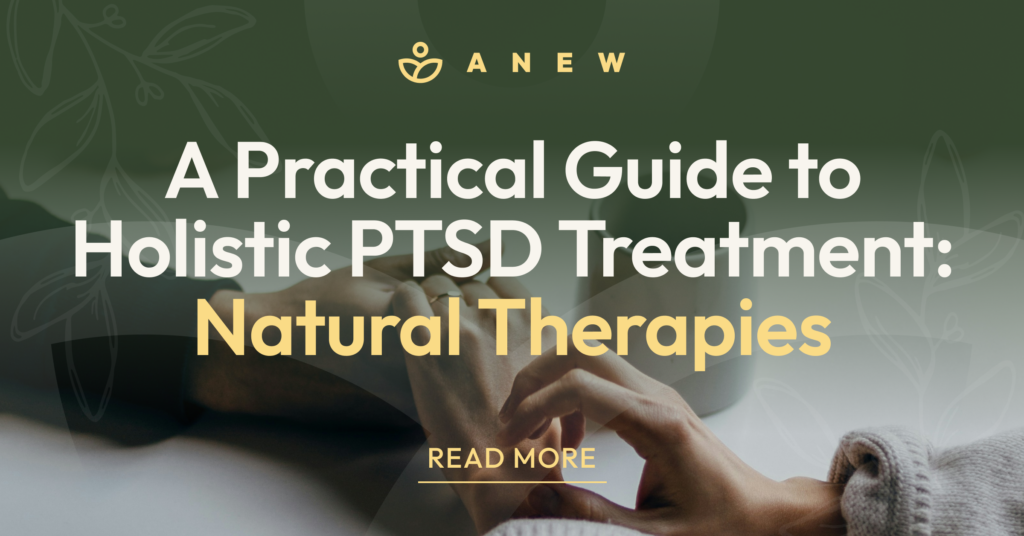Holistic PTSD treatment aims to address the mind, body, and spirit to support lasting recovery from trauma. PTSD, or post-traumatic stress disorder, often manifests through intrusive symptoms such as flashbacks, nightmares, and intense anxiety. Besides affecting mental health, trauma impacts physical health, complicating recovery efforts.
Here’s a quick insight into holistic PTSD treatment:
- Yoga and Physical Exercise: Improve mental and physical resilience.
- Meditation and Mindfulness: Promote emotional regulation and stress reduction.
- Ketamine Therapy and Spravato: Innovative treatment that offers rapid relief from symptoms.
- TMS (Transcranial Magnetic Stimulation): Uses magnetic pulses to improve mood and reduce PTSD symptoms.
- Nutrition and Supplements: Improve psychological well-being.
- Expressive Writing: Help process trauma and reduce stress.
By focusing on these diverse therapies, holistic PTSD treatment provides a comprehensive approach to healing that goes beyond traditional methods.

Understanding PTSD and Its Symptoms
Post-traumatic stress disorder (PTSD) is more than just a mental health condition; it’s a complex interplay of psychological and physical symptoms that arise after experiencing trauma. Let’s break down some of the core symptoms that define PTSD:
Intrusive Memories
Intrusive memories are unwanted and often distressing recollections of a traumatic event. They can manifest as flashbacks or nightmares, making it feel as if the trauma is happening all over again. These memories are not just vivid; they can be intense and emotionally overwhelming, disrupting daily life.
Avoidance
Avoidance is another hallmark symptom of PTSD. It involves steering clear of people, places, or activities that remind you of the traumatic event. This can extend to avoiding thoughts and feelings related to the trauma. While it might seem like a way to cope, avoidance often leads to increased isolation and can hinder recovery.
Negative Thinking
PTSD can significantly alter how you think about yourself and the world around you. Negative thinking patterns may include feelings of hopelessness, guilt, or shame. Individuals with PTSD might also experience distorted beliefs about themselves or others, such as thinking they are to blame for the traumatic event or that the world is an entirely dangerous place.
Physical Changes
The physical symptoms of PTSD stem from the body’s heightened stress response and can include:
- Sleep disturbances like insomnia or restless sleep.
- Irritability or aggression due to constant hypervigilance.
- Increased heart rate and blood pressure, raising the risk of long-term health issues like hypertension.
A study by the U.S. Veterans Affairs found that veterans with PTSD face a significantly higher risk of high blood pressure, particularly when severe physical injuries are involved. This highlights the importance of a treatment approach that supports both mental and physical well-being.
At Anew, we offer innovative treatments like Spravato (esketamine nasal spray) and IM ketamine therapy, and TMS (Transcranial Magnetic Stimulation). These therapies have shown promise in alleviating PTSD-related depression and can be a key part of a holistic healing journey.
Next, we’ll explore how mind-body practices like meditation and mindfulness help regulate emotions and manage PTSD symptoms.
Holistic PTSD Treatment: Natural Therapies
When it comes to holistic PTSD treatment, natural therapies offer a comprehensive approach that addresses both the mind and body. By integrating mind-body practices, complementary health techniques, and alternative therapies, individuals can find relief from PTSD symptoms and improve their overall well-being. Let’s explore some of these powerful methods.
Meditation and Mindfulness
Mindfulness meditation is a cornerstone of holistic PTSD treatment. It helps individuals cultivate present moment awareness, which is crucial for emotional regulation and stress reduction. By practicing mindfulness, individuals learn to observe their thoughts and feelings without judgment, reducing the intensity of PTSD symptoms.

Regular meditation has been shown to make structural changes in the brain, particularly in areas associated with memory and emotional regulation. This rewiring can help individuals respond more effectively to stress and trauma.
Yoga and Physical Exercise
Yoga is more than just physical exercise; it’s a holistic practice that combines movement, breathwork, and mindfulness. Trauma-informed yoga, in particular, is designed to help individuals with PTSD reconnect with their bodies and cultivate a sense of safety and inner peace.
Yoga and other forms of physical exercise release endorphins, improve sleep quality, and reduce anxiety. Whether it’s running, swimming, or dancing, finding an enjoyable activity can significantly impact mental health. Regular exercise serves as a healthy outlet for stress and empowers individuals by fostering self-expression and creativity.
Innovative Therapy Options
Anew Therapy Utah provides cutting-edge treatments for PTSD, including Spravato (esketamine nasal spray), IM ketamine therapy, and Transcranial Magnetic Stimulation (TMS). These evidence-based therapies are designed to help individuals struggling with PTSD, depression, and anxiety.
Spravato and ketamine therapy work by targeting neurotransmitters in the brain, offering rapid symptom relief and supporting long-term healing. TMS, a non-invasive treatment, uses magnetic pulses to stimulate brain regions involved in mood regulation, helping to reduce PTSD symptoms without medication.
These treatments can be integrated into a personalized, holistic plan that combines conventional medical care with complementary therapies, giving individuals a well-rounded path to recovery. Many of these treatments are covered by insurance, making them more accessible to those seeking relief.
Herbal and Nutritional Supplements
Diet plays a significant role in managing PTSD symptoms. Nutrient-rich foods, especially those high in omega-3 fatty acids and antioxidants, support brain health and reduce inflammation. Avoiding stimulants like caffeine and alcohol is also crucial for mood regulation and better sleep patterns.
Herbal remedies like ashwagandha, kava root, and green tea have mood-improving effects, while supplements like vitamin D can address deficiencies linked to PTSD.
Anew Therapy Utah also offers vitamin injectables to support overall well-being. Options like NAD+ help improve cellular health and mental clarity, B-complex enhances energy levels, and glutathione aids in detoxification and immune function. By providing essential nutrients directly, these injectables can help reduce inflammation, increase vitality, and promote resilience—key factors in PTSD recovery.
Expressive Writing and Journaling
Expressive writing is a therapeutic tool that allows individuals to process and manage painful events that might trigger PTSD symptoms. By writing down thoughts and feelings, individuals can gain insight into their emotions, reduce stress, and promote psychological well-being.
Research shows that journaling can be an effective standalone treatment or complement other therapies. It helps individuals increase mindfulness and remain in control of their emotions, providing a safe space for self-reflection and healing.
These natural therapies, combined with innovative treatments like Spravato and ketamine therapy, offer a holistic approach to managing PTSD, empowering individuals to take charge of their healing journey. Next, we’ll explore how integrating these practices with conventional treatments can improve recovery and promote long-term well-being.

Integrating Holistic and Conventional Treatments
Combining holistic therapies with conventional treatments can enhance PTSD management, offering a more well-rounded approach to healing. This integrative model merges complementary and integrative health (CIH) practices with established medical treatments to support the whole person—mind, body, and spirit.
Spravato, Ketamine Therapy, and TMS
Spravato (esketamine nasal spray) is gaining recognition for its rapid relief of depression symptoms, which frequently accompany PTSD. Offered by Anew Therapy Utah, Spravato is often covered by insurance, making it an accessible option for many. It is administered in a controlled setting to ensure safety and optimize its therapeutic benefits.
Ketamine therapy has emerged as a powerful tool in treating PTSD. Unlike traditional antidepressants, which can take weeks to take effect, ketamine provides fast-acting relief. Anew Therapy Utah supports its use due to strong clinical evidence demonstrating its effectiveness in alleviating PTSD symptoms.
TMS (Transcranial Magnetic Stimulation) is another cutting-edge treatment that offers a drug-free, non-invasive approach to managing PTSD and depression. By using magnetic pulses to stimulate underactive areas of the brain involved in mood regulation, TMS has been shown to improve neural connectivity, reduce symptoms, and promote long-term healing.
Integrating CIH practices with these innovative treatments leads to more comprehensive care. For instance, mindfulness meditation can prepare the mind for ketamine therapy, enhancing introspective experiences and aiding in emotional processing. Expressive writing can help patients articulate and integrate insights gained from therapy sessions, while yoga and physical exercise contribute to overall resilience and stress reduction.
At Anew Therapy Utah, we believe in a holistic, patient-centered approach—combining the rapid relief of Spravato, ketamine, and TMS with complementary practices for a balanced recovery path. This synergy accelerates healing, offering a deeper, more sustainable transformation.
Conclusion
Healing from PTSD isn’t just about reducing symptoms—it’s about treating the whole person. A holistic approach integrates both conventional and natural therapies, creating a balanced path to recovery.
At Anew Therapy Utah, we offer personalized treatment plans that combine the rapid symptom relief of Spravato, ketamine therapy, and TMS with mindfulness, expressive writing, therapy and medication management for long-term healing. Spravato, in particular, provides fast relief from PTSD-related depression and is often covered by insurance, making it more accessible.
Our patient-first approach ensures that every aspect of your well-being is considered. Our dedicated team works closely with you to develop a customized treatment plan that aligns with your personal journey and goals.
Take the next step toward healing. Explore our services, including Spravato, ketamine therapy, and TMS, by visiting our services page. Let us help you find a path to a healthier, more fulfilling life.

Searching for the best ketamine clinic in Utah? Anew Therapy offers expert care and proven results. Schedule your free intake appointment today.

